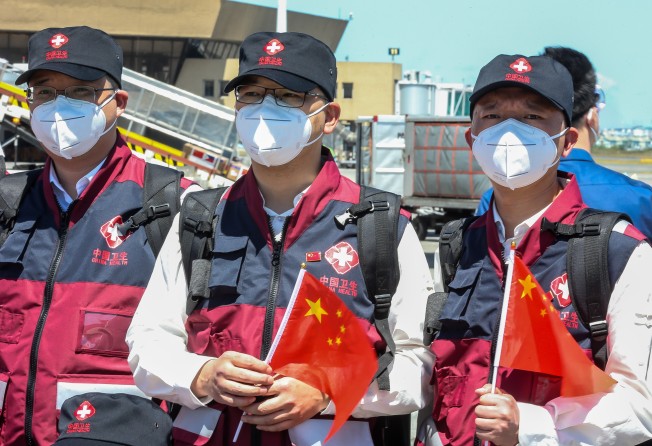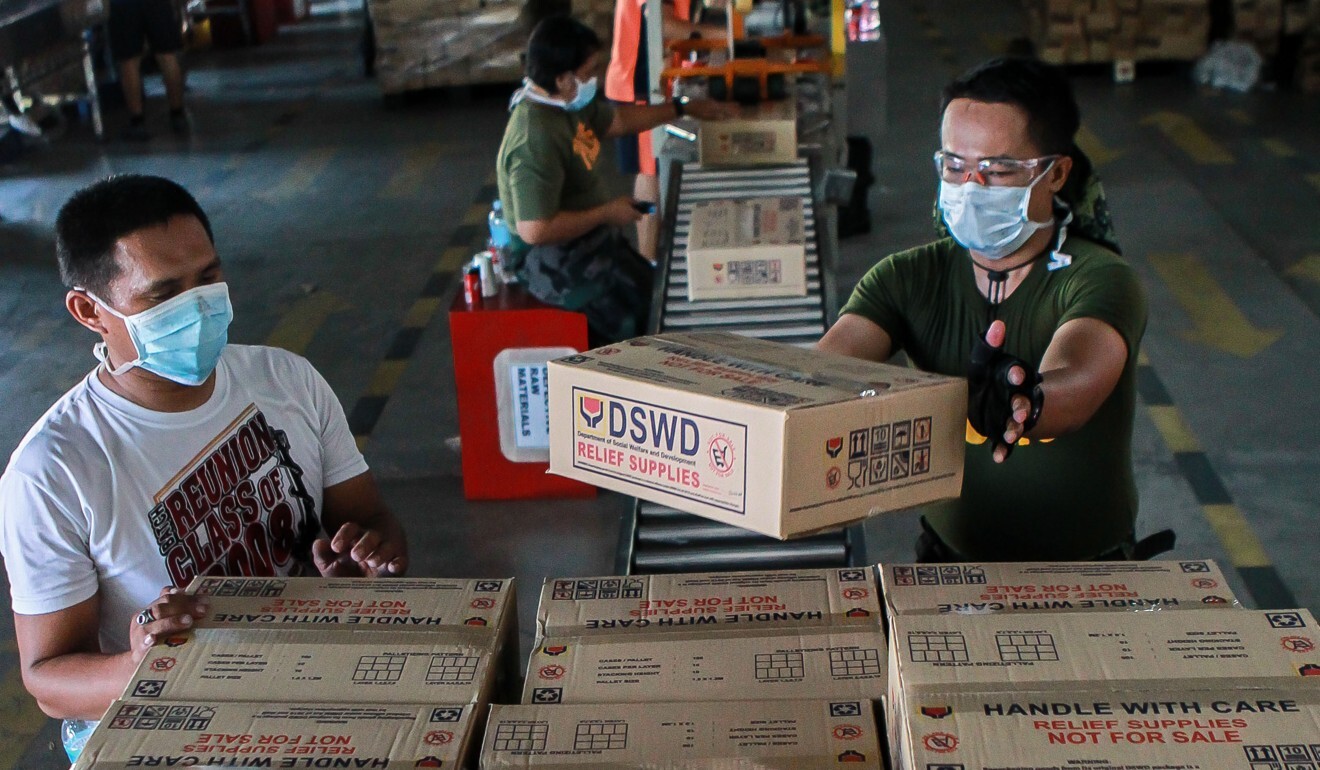Welcomed the Chinese medical expert team earlier today with Ambassador Huang, DFA Secretary Locsin, PCOO Secretary Andanar, DOE Secretary Cusi and Presidential Chief Protocol Robert Borje.#BeatCOVID19 #WeHealAsOne #BeatCOVID19 pic.twitter.com/osVfSxvBPK
— Secretary Francisco T. Duque III (@SecDuque) April 5, 2020
Coronavirus: Chinese experts to share frontline experience in Hubei with Philippine doctors
- Two hospitals, including the Philippines’ designated Covid-19 referral centre, are hoping to gain ‘precious’ knowledge from the specialists on combating the pandemic
- Meanwhile, the country’s Covid-19 referral centre says the 25,000 test kits donated by Alibaba founder Jack Ma cannot be used as they have missing parts

Two of the Philippines’ oldest hospitals hope to gain “precious” knowledge from a group of Chinese medical experts who have arrived in the Southeast Asian country to share their frontline experience fighting and containing the coronavirus pandemic.
The 12 doctors are specialists in respiratory and infectious diseases, critical care, and integrated traditional Chinese and western medicine, said Huang Xilian, China’s envoy to the Philippines, who on Sunday welcomed the group on the tarmac. Huang was joined by Philippine foreign secretary Teodoro Locsin, Jnr, who had invited the experts, and health secretary Francisco Duque III.
“Most team members have had frontline experience in Hubei province fighting the epidemic,” Huang said.
The central Hubei province was where the first reports of the virus were recorded, with the outbreak’s epicentre located in its capital, Wuhan. Similarly, the Philippines’ National Capital Region, or Metro Manila, is the centre of the local spread.
The specialists were expected to meet doctors from the Chinese General Hospital (CGH) this week, said its spokesman, Dr Jason Letran, but he did not know exactly when, since it was the Chinese embassy setting the schedule.
The 600-bed hospital, founded by Chinese immigrants in 1878, had allotted 40 beds for Filipino and Chinese coronavirus patients, and these were now all filled, Letran said.
He said they could not expand their capacity due to staffing constraints and the number of personal protective equipment (PPEs) they had. “As we need at least 120 to 140 medical PPEs a day, we only have enough on a day-to-day basis [and] a little surplus.”
Letran said the 12 Chinese experts would help “in the capacity of medical advisers as they do not have the licence to practise medicine in our country”.
“We are hoping that with their extensive experience in managing Covid cases, their additional input may be valuable in helping our patients,” he said.
Letran said that with the expected language barrier, Chinese General Hospital doctors “can serve as conduit to bridge the gap with the Chinese doctors”.
It is not known whether the Chinese specialists would also meet doctors from the Philippine General Hospital, the country’s premier health facility that the government has designated as the Covid-19 referral centre, but its spokesman said they were open to it.
“I think it’s a good idea to get some pointers from them … if those Chinese doctors will be sharing precious information we can learn from,” said Dr Jonas del Rosario from the Philippine General Hospital (PGH).
The 110-year-old teaching hospital, run by the University of the Philippines, has assigned 500 doctors, 600 nurses and several hundred paramedical workers on staff to fight the pandemic. The 1,500-bed institution has also set aside 60 ventilators and 130 beds, including 30 intensive care unit beds, to treat infected patients, Del Rosario said.
“We expect this to be filled up in a week or so,” he said, as more hospitals refer their “moderately to severely ill” patients to the Philippine General Hospital, and the number of confirmed cases continue to rise with more widespread testing.
As of Monday, the Philippines recorded 3,660 infections and its death toll stood at 163, while at least 73 have recovered after the country tested nearly 20,000 people.
Del Rosario said other big hospitals were no longer accepting coronavirus patients because their wards were already full. They were now referring the overflow of ill patients to the Philippine General Hospital.
He said the health care sector would face a quandary should the number of infections exceed the maximum capacity of hospital beds and number of health care workers in Metro Manila. As for PPEs, the Philippine General Hospital relies on private donations and the health department, Del Rosario said.

To protect its health workers, the Philippine General Hospital will test them for the virus every two weeks, he said.
However, they will not be tested with the 25,000 test kits donated by Alibaba founder Jack Ma to the Philippines, as these had missing parts and were not yet approved for local use, Del Rosario said.
“Unfortunately, we could not use them at this time because they are not FDA (Food and Drug Administration)-approved” and they were missing “extraction kits”, he said.
According to molecular biologists, the test kits should have come with components used for extracting macromolecules. “It should have been part of what the supplier sent, part of the test kit itself,” Del Rosario said.
Alibaba owns, among other organisations, the South China Morning Post.
Del Rosario said the Philippine General Hospital was open to collaborating with military scientists from China on a clinical trial in search of a coronavirus vaccine. “If the design of that clinical trial is good and it has good a basis, why not? We are an academic centre and clinical trials are most welcome.”
Last month, doctors from the Chinese General Hospital spoke to their counterparts in Zhejiang province via a video conference in which Letran, who speaks conversational Mandarin, served as translator.
“The conference made us realise we are doing the exact thing that they have done,” Letran said. “However, our abilities to contain the disease are severely limited by the scarcity of resources” – especially the lack of PPEs, as well as test kits, “which would have led to an earlier detection of subclinical cases, which are actually the main source of the rapid spread of the infection”.